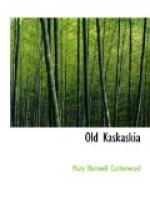“I reckon you have, and I reckon you better use them. You git your family over on to the bluff before your house is sucked into the Okaw.”
“And go and hoe the weeds out of your maize patch, Antoine,” exhorted Father Baby, setting an empty glass back on the bar. “I cleaned part of them out for you myself, with the rain streaming down my back, thinking only of your breadless children. And what do I find when I come home to my shop but that Antoine Lamarche has been in and carried off six dog-leg twists of tobacco on credit! I say nothing about it. I am a childless old friar; but I have never seen children eat tobacco.”
The baited Frenchman turned on Father Baby; but, like a skittish girl, the friar hopped across the room, shook off his wooden shoes, picked up the skirt of his habit, and began to dance. The exhilarating drink, the ruddiness of the fire, the discomfort outside, the smoothness of the oak boards,—these were conditions of happiness for Father Baby. This was perhaps the crowning instant of his experience. He was a butterfly man. He saw his lodger, Dr. Dunlap, appear at the door as haggard as the dead. The friar’s first thought was:—
“That fellow has proposed for Mademoiselle Saucier and been rejected. I’m glad I’m a churchman, and not yoked up to draw a family, like these fools, and like he wants to be. This bowing down and worshiping another human being,—crazy if you don’t get her, and crazed by her if you do,—I’ll have none of it.”
Dr. Dunlap raised his arms and shouted to the company in the bar-room. What he said no one could hear. Hissing and roaring filled the world, submerging the crackling of the fire, the banjo tunes, and human voices. Men looked at each other, stupefied, holding their pipes from their mouths. Then a wave struck the solid old tavern, hissed across its gallery, and sprawled through the hall upon the bar-room floor. Not a person in the house could understand what had happened to Kaskaskia peninsula; but Jean Lozier stood on the bluff and saw it.
Jean was watching the lights of Kaskaskia while his sick grandfather slept. The moon was nearly full, but on such a night one forgot there was a moon. The bushes dripped on Jean, and the valley below him was a blur pierced by those rows of lights. A great darkness was coming out of the northwest, whistling as it came. He saw the sky and the turbid Mississippi meet and strangely become one. There were waters over the heavens, and waters under the heavens. A wall like a moving dam swept across the world and filled it. The boy found himself sitting on the ground holding to a sapling, drenched and half drowned by the spray which dashed up the bluffs. The darkness and hissing went over him, and he thought he was dying without absolution, at the end of the world. He lay down and gasped and shuddered until the great Thing was gone,—the incredible Thing, in which no one believes except him who has seen it, and which no name can name; that awful spirit of Deluge, which lives in the traditions of every race. Jean had never heard of waterspout or cloudburst or any modern name given to the Force whenever its leash is slipped for a few minutes. He felt himself as trivial a thing in chaos as the ant which clung on his hand and bit him because it was drowning.




